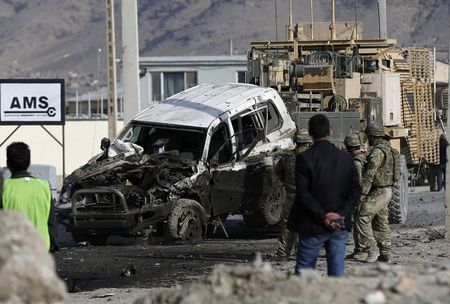By Mirwais Harooni
KABUL (Reuters) - A suicide car bomber rammed a NATO military convoy along a major road out of Afghanistan's capital Kabul early on Monday, killing one Afghan civilian, authorities said.
It was the second car bomb attack on international forces in Kabul in a month as Taliban insurgents and their allies step up attacks ahead of the withdrawal of most foreign troops at the end of the year.
The Taliban claimed responsibility for the attack on the Jalalabad Road, a main thoroughfare with a U.S. military base and a housing compound for U.N. and other international contractors and aid workers.
At least three foreigners were wounded in the blast targeting their armored vehicles, but their identities were not known, police said.
A spokesman for the U.S.-led NATO mission in Afghanistan said a patrol was attacked but there were no fatalities among the international force. The force does not confirm injuries.
The bomber in a Toyota Corolla car drove into the convoy just before 7 a.m., said Farid Afzali, head of Kabul's police investigation department.
"As a result of the blast, one of our countrymen was killed and three foreigners slightly wounded," Afzali said.
Reuters television footage showed the remains of one of the white armored vehicles, its engine blackened and mangled and side door damaged.
Taliban spokesman Zabihullah Majahid said on Twitter that the target was a foreign military convoy and several troops were killed. The insurgents, who are fighting to expel foreign forces and re-establish their strict Islamist state driven from power in 2001, often exaggerate the results of their attacks.
The Taliban have been seeking to create instability ahead of this year's withdrawal of most foreign troops and also test the mettle of the newly trained Afghan security forces who will bear most of the fight next year.
On Sunday, two Taliban suicide bombers stormed a police station in the northern city of Mazar-i-Sharif, killing two and wounding 18.

(Reporting by Mirwais Harooni. Writing by Kay Johnson; Editing by Michael Perry, Robert Birsel)
